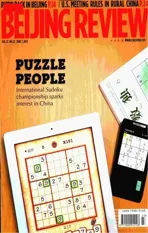Do We Need Our Own Mother’s Day?
2012-10-17
Do We Need Our Own Mother’s Day?
On May 13, this year’s Mother’s Day, mothers in China received an outpouring of gifts and greetings from their children. For the past years, along with many other Western festivals, Mother’s Day has become popular with the Chinese.However, some people believe China should draw on its own traditions to express gratitude and respect to mothers in a Chinese way,rather than borrow from a Western custom.
This is not a new topic. Many think that the Chinese are widely regarded for stressing family bonds, and filial piety is an old virtue here. Thus, it’s natural to select a day as Chinese Mother’s Day. It is suggested by some scholars that the second day of the fourth lunar month should be designated as China’s Mother’s Day, because it is the day that Mencius’ mother gave birth to him.Mencius (372-289 B.C.), a great Chinese philosopher, was arguably the most famous Confucian after Confucius himself. There are many excellent mothers in Chinese history,with Mencius’ mother as a prime example.She is famous for her efforts to provide Mencius with a peaceful and sound life and studying environment by moving the family three times until a perfect place was found.This year, the topic of Chinese Mother’s Day again sparks heated debates.
Supporters
Mi Zhenyu (www.eastday.com): The second Sunday of May is not the universally recognized Mother’s Day in the world, but the U.S. Mother’s Day. To take this day as China’s Mother’s Day is improper. China is a great nation of excellent cultural heritage,so we Chinese need our own Mother’s Day that can best re fl ect the greatness of Chinese mothers and Chinese culture.
Li Hanqiu (www.eastday.com): It’s ridiculous to take it for granted that U.S. Mother’s Day is the global Mother’s Day. Many countries have already had their own Mother’s Day. For example, France’s Mother’s Day came 14 years later than the U.S. one, and on the last Sunday of May. In Thailand, Mother’s Day is on August 12; and in the Arab region, Mother’s Day is generally on March 21 at the vernal equinox.

We need to safeguard the dominant position of Chinese culture in China. Besides,Chinese need to contribute to the founding of our own Mother’s Day with enough con fidence in Chinese culture, bearing in mind the strategic importance of doing so.
Yu Yuan (www.xinhuanet.com):Chinese tradition puts filial piety ahead of all other good merits. How to encourage the Chinese to cherish their own Mother’s Day is a big issue related to the nation’s cultural identity. Only with a strong cultural identity can we expect to see real revitalization of the Chinese nation. China should prefer its own traditional festivals to Western festivals.
Sun Feng (www.xinhuanet.com): The American people have their Mother’s Day and we Chinese need our own Mother’s Day,too.
Chinese mothers are industrious, caring and tolerant. But for so many years, China hasn’t celebrated its own Mother’s Day.Nowadays, young Chinese like to follow Western fashion, celebrating Mother’s Day on the second Sunday of May.
It’s not just a simple question of festival,but it relates to the heritage of Chinese culture and the young generation’s personal development. To set up a Chinese Mother’s Day or Father’s Day will help to promote the nation’s filial piety in the whole society, and also, it will encourage the young generation to love their country and national culture.
Opponents
Qing Chuan (www.rednet.cn): Many people have appealed to choose a day as China’s own Mother’s Day, instead of joining the Americans in celebrating their Mother’s Day. But the fact is, the U.S. Mother’s Day is already very popular with the Chinese, not only because Sunday is convenient for most people, but also because love and respect for mothers is a feeling shared by all nations.Thus, to set up a Chinese Mother’s Day is un-necessary. Even if we have our own Mother’s Day, that will not stop some Chinese from celebrating the U.S. one.
We should learn from others with a tolerant attitude. Any useful and advanced things that the Chinese feel like accepting should be adopted, particularly excellent culture. Western festivals like Thanksgiving,Valentine’s Day, and Mother’s Day, provide positive guidance to the young generation.Like scientific and technological advancement, cultural improvement should also incorporate excellent heritage from the past and from the outside.
It’s wrong to blindly reject all “Western”things in fear of being “Westernized.” We already celebrate many international festivals, such as Labor Day and Women’s Day.According to some scholars’ logic, these festivals should also be expelled and replaced with our own Labor Day and Women’s Day.
To abruptly connect a simple moral festival to the bigger theme of “historical and cultural identity and even national belief and cohesion” is really making a fuss. This is not the attitude a mature nation’s people should have toward foreign culture.
Zhang Fengyi (www.xinhuanet.com):As for whether China should have its own Mother’s Day, we first need to make some problems clear. Is it necessary to restrict “the expression of gratitude” to a certain mode?
Second, is it that Eastern and Western cultures are rivals? Some people have been trying to resist the Western Valentine’s Day with Chinese Qixi Festival (the seventh day of the seventh lunar month, inspired by a romantic Chinese love story) and are now fi ghting against U.S. Mother’s Day with a newly invented Chinese Mother’s Day. It seems that these people are trying to safeguard Chinese culture, but in reality this reflects a narrowminded thinking.
In the era of globalization, no culture can stand in isolation. Nowadays, people in other countries also celebrate the Chinese Spring Festival, the most important traditional festival of China. In some countries and regions,the Spring Festival is even a legal holiday.Western cultures can fi ll the gaps that Chinese traditional festivals leave, thereby enriching China’s cultural life. We may not know the origin of Mother’s Day in May, but as long as it reminds us of fi lial piety and gratitude to mothers, it’s enough.
Many traditional Chinese festivals have become legal holidays, like the Dragon Boat Festival, Tomb Sweeping Festival and Mid-Autumn Day, in recent years. But these days seem to be more helpful for business people to do relevant business and scenic spots easier to attract tourists than for the real festival culture to spread. We already have many festivals, and to invent a new Chinese Mother’s Day will likely just provide another opportunity for business people to make big money, and little else.
In the face of overwhelming globalization, traditional festivals can indeed serve as a cushion to safeguard our own national culture. But the urgent task facing us is not to passively reject, but to develop and spread our own culture on the basis of absorbing fi ne foreign customs. It’s better to enrich and develop existing traditional festivals than to invent another Mother’s Day.
Li Qing (Jiaxing Daily): It is true that many young Chinese today are enthusiastic about “foreign festivals” like Christmas,Valentine’s Day and even relatively unknown festivals such as Easter and Thanksgiving.Instead, they lack the knowledge of China’s traditional festivals. This is an unpleasant scenario, but it’s not so intolerable that we have to invent a Chinese Mother’s Day to fight against and reject Western Mother’s Day.
Although Mother’s Day is an “imported festival,” its spirit is international—showing respect and gratitude to mothers. Celebrating U.S. Mother’s Day is not a special worship of Western culture.
To encourage the young generation to cherish Chinese traditional festivals is important, but this goal can’t be achieved by resisting “imported festivals.” What we need to do is to properly reform and improve our own festivals so that they will attract young people and suit modern life.
The suggestion that Mencius’ birthday should be designated as China’s Mother’s Day is constructive. However, a better understanding of festival functions and cultural communication will persuade people that whether we have our own Mother’s Day or not isn’t so important. The love for mother is the same around the world, so there are fewer differences in culture and ideology when it comes to Mother’s Day than in other foreign festivals. To worry about Western cultural expansion in the name of Mother’Day and even raise this question to the height of national cultural safety is unnecessary. These worries reflect some people’s lack of self-con fi dence and tolerance of outside culture.
